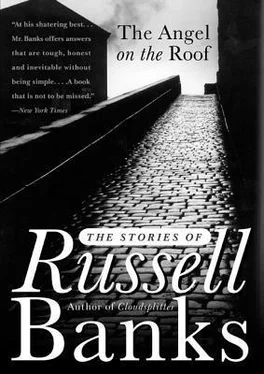“No,” she said. “But I didn’t expect him to be there this morning. I’d stopped looking for him by yesterday.”
“Oh. Why did you tell me the story, then? What’s it about?”
“About? I don’t know. Nothing, I guess. I just felt sorry for the man. And because I was afraid, I shut up and left him alone. And then he was gone.” She was still studying her tiny hands.
“What were you afraid of?”
“You know, sounding dumb and naive. And making him mad at me.”
“That’s only natural,” I said and put my arms around her. “Everyone’s afraid that way.”
She turned her face into my shoulder. “I know, Russell, I know. But still…”
Some years ago, before I married and took a position with a company whose entire operation was domestic — before I came home, as it were — I was employed by a Hopewell, New Jersey, company owned by a multinational consortium based in Amsterdam. We manufactured and sold women’s and children’s high-style rubberized sandals, and our assembly plant was located in Gbandeh, the second largest city in the Democratic Republic of Katonga, then a recently de-Socialized West African nation. With an area the size of Vermont and a population just under that of Spain, Katonga in those Cold War years was a capitalist pawn on the African chessboard and was thus the recipient of vast sums of U.S. foreign aid, which, as usual, financed a thuggish oligarchy of connected families who sent their children to private schools abroad and drove about the country in fleets of Mercedes-Benzes and Land Rovers. Thanks to American military engineers and civilian contractors, roads were paved, electric and gas utilities were reliable, and the Gbandeh airport could handle the air traffic of a city the size of Toronto or, if necessary, launch a fleet of B-52s against targets from Libya to the Seychelles. Also, there was the inevitable undisciplined but well-armed police force that kept order over an impoverished population of displaced rural peasants eager to assemble Western goods for a few dollars a week.
I don’t apologize for these conditions, nor do I judge them. Simply, they were, for me, working conditions, just as they were for our Katongan assemblers and managers. History created the conditions, and I, like my African cohorts, saw myself as merely an ordinary man with a small job to do, a job that could have no effect on history one way or the other.
As the newly hired head of the company’s research-and-development division, I was obliged early in my tenure to visit our assembly plant in Gbandeh and make the acquaintance of the company representatives and local managers, ostensibly to facilitate future communication between the New Jersey home office and its African outpost, but mainly to evaluate the Katongans’ ability to adapt to the fast-changing demands of our sales force. The design and materials for our product were subject to the shifting whims of American and European women and children with disposable incomes and self-images easily manipulated by advertising. We were working, therefore, in a very competitive field. Our people, all our people, from manufacturing and assembly to advertising and sales, had to be extremely adaptable: we had to be both creative and reactive in equal measures. In Africa, I stood at the crossroads of the two.
From the day I arrived, I was fascinated by the nature of my assignment, which was essentially to be a translator, not of languages — the national language of Katonga was English, after all — but of economic customs and procedures. My goal was to replace inefficiency, corruption, and indolence with competence, honesty, and service. To that end, I had to find ways for the Africans to adapt to us and ways for us to adapt to them. Both parties had to change. For years my predecessor had ignored this difficult task, but, luckily, I found the work at once wonderfully engaging and even began to wish the job were a permanent one. I had no desire to return home to New Jersey anytime soon.
Then, early one evening, when I had been in Gbandeh for nearly three weeks, I took my now customary stroll around the sadly neglected Binga Park, named for the assassinated national hero, Henry Binga, and things unexpectedly changed. Bordered by stately royal palms, the rectangular park was faced by the five most important buildings in town: the modernist, black-glass, local branch of Citibank; the slat-windowed police bunker; the crumbling, neoclassical manse that served as a municipal office building; the Masonic temple, a forbidding, yellow brick ziggurat; and my neobaroque hotel, the Gbandeh Grande. At the end of the day, when the sun drooped behind the western hills, and the cooling shadows of the buildings and royal palms began to lengthen, it was pleasant to walk the square, nodding to the guards, doormen, peddlers, and lounging taxi drivers whose faces I had come to recognize, and end my stroll at a quiet café located in a narrow cul-de-sac off the square a short block from my hotel. There my habit was to sit alone at an outdoor table and drink two chilled bottles of Rhino, the national beer, and over dinner enjoy the sight of the locals trickling into the square from the nearby tenements, rooming houses, and crowded worker-hotels. At such times, even after only three weeks, I felt almost at home in Africa.
Since my arrival, most of my days had been spent out at the assembly plant, a dozen kilometers from downtown Gbandeh. Our plant was one of three low, cinder-block cubes in the optimistically named Gbandeh Industrial Park, which was less a park than a permanent construction site, a huge, windblown plain burned and bulldozed out of the equatorial rain forest a decade ago. There were small camps of squatters growing like dingy coral along the far edges of the park — clusters of corrugated tin huts, cast-off shipping containers, and abandoned cars, trucks, and buses. Some of our workers came from these camps; the rest lived in Gbandeh in conditions not much better. All had once been subsistence farmers who had abandoned their rural land holdings for wage-earning jobs in the city.
Inside the factory, which was not air-conditioned, everyone sweltered, management and assemblers alike, and red dust from the eroded plain blew without letup through the open windows, covering materials, tools, packaging, and people, whether on the assembly line or behind a desk in the manager’s office, with a powdery skin of ferrous oxide. I had a driver and car at my disposal and consequently at every opportunity slipped back to Gbandeh to my air-conditioned hotel room, where I showered, changed into clean clothes, wrote my reports for the home office, and, before heading out for my afternoon stroll, briefly recovered in the familiar comfort of solitude from the dissonant, invasive company of the Katongans.
Not that I disliked the natives. In general, they were decorous and intelligent people, friendly to foreigners, especially Americans. I liked them. But they possessed a puzzling type of ethnic and national pride. It flew in the face of their social and political realities, which were hardly the realities that inspire and justify a true pride, the things, for instance, that make Americans proud: independence, the work ethic, cultural and economic achievement, and so on. Perhaps it was only false pride that made the Katongans seem querulous and loud and self-admiring — a defensiveness fueled by generations of colonial and post-colonial dependency, deracination, poverty. Nonetheless, I found it irritating. They blew their own horns, as it were, continuously, especially to strangers, and loudly sang the praises of the most trivial expression of their national character and culture — their affection for the roasted flesh of chimpanzees, for instance — as if it were something to be universally admired and imitated.
Читать дальше












